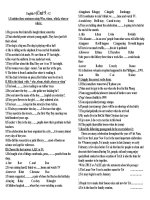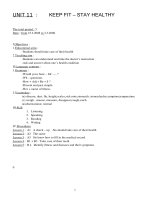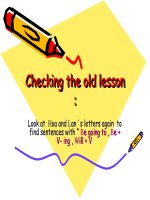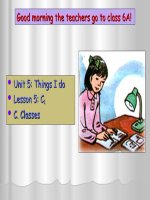Unit 3Becoming independanceK11new
Bạn đang xem bản rút gọn của tài liệu. Xem và tải ngay bản đầy đủ của tài liệu tại đây (225.92 KB, 18 trang )
<span class='text_page_counter'>(1)</span>Date of preparation: September, 25th 2015 Distributive period: 20. Unit 3. Date of signing: September, 28th 2015 Date of teaching:. becoming independent Lesson 1 Getting started. A. Objectives: 1. Language focus - To help learners get started with some language items in Unit 3 - For vocabulary, that is words and phrases related to being independent - For pronunciation, that is sentence stress and rhythm: linking between a consonant and a vowel - For grammar, that is to infinitive after some adjectives and nouns. 2. Skills - To help learners get started with 4 skills in Unit 3 - Reading: Reading for general ideas and specific information about time-management skills - Speaking: Giving opinions about of the skills needed for being independent - Listening: Listening for specific information about how children are raised to become independent - Writing: Write a letter requesting further information about a course 3. Attitudes - To help Ss get started for Unit 3 with the topic "becoming independent" - To provide Ss some motivation B. Preparations: - Teacher: Handouts, textbook, lesson plan, pieces of papers and cassette. - Students: Textbook C. Methods: - The whole lesson: Integrated, mainly communicative. D. Procedures: Time/Stages Activities Interactions 1. Warm up 5 minutes 2. New lesson 10 minutes. 12 minutes. Lead in Inform the class of the lesson objectives: Getting to know the topic, vocabulary relating to relationships Ask them look at the pictures and guess what they show Activity 1: Listen and read - Tell Ss that they are going to listen to a conversation between Mai and Lan. - Play the recording - Ask Ss listen to the recording and read the conversation. - Ask Ss to look at the picture and answer the question - How do you think the people in these picture are? Suggested answer: They are active, confident and independent Activity 2: Read the conversation again. Answer the questions about the conversation. 15 minutes. - Ask Ss to work individually and finish the task - Ask them to exchange their answers with a partner. Keys: 1. Because Minh doesn't rely on other people for help and isn't influenced by other people's opinion 2. Because he always completes his tasks on time, and never need to be reminded about assignments and other schoolwork. 3. He tried hard and spent the whole night on a hard Maths problem when most students in the class had given up 4. He always tries to find solutions to his problems and seldom needs help from others 5. Responsible, reliable, self-reliant, determined, well-informed and confident. T <--> Ss. T <--> Ss Whole class. Individually. T <--> Ss.
<span class='text_page_counter'>(2)</span> 6. Student's own answer Activity 3: Read the conversation again, match the words with their definitions. - Ask Ss to work individually and finish the task - Ask Ss to do the task then compare the answer with their partner Keys: 1.d 2. e 3. b 4. c 5. f 6. A Activity 4: Find the sentences with to-infinitives after. Pair work. adjectives or nouns in the conversation and write them in the spaces below. 3.. Consolidation. 2 minutes 4. Homework 1 minute. Keys: 1. It's good to have a friend you can rely on 2. Even our Maths teacher was very surprised to read his answer 3. His parents must be really pleased to have such a son 4. But he still have time to read ... 5. It's interesting to talk to him 6. I really admire his ability to make decisions so quickly 7. You're lucky to have a close friend like him - Ask Ss: What have you learnt today? What can you do now? - Summarize the main points of the lesson. - Ask Ss to learn by heart the words or phrases related to the relationship. - Prepare for the next lesson.. T <--> Ss. T <--> Ss T <--> Ss. E. Experience: ......................................................................................................................................................................................... ......................................................................................................................................................................................... .......................................................................................................................................................................................... Date of preparation: September, 25th 2015 Distributive period: 21. Date of signing: September, 28th 2015 Date of teaching:. Unit 3 becoming independent Lesson 2 Language. A. Aims and Objectives: 1. Language focus - To provide learners some language items in Unit 3 - For vocabulary, that is words and phrases related to being independent - For pronunciation, that is sentence stress and rhythm: Linking between a consonant and a vowel - For grammar, that is to infinitive after some adjectives and nouns 2. Skills - To promote Ss to develop the skill of working in pairs and groups 3. Attitudes - To encourage Ss to work harder - To provide Ss some motivation B. Preparations: - Teacher: Handouts, textbook, pieces of papers, lesson plan and cassette. - Students: Textbook C. Methods: - The whole lesson: Integrated, mainly communicative. D. Procedures: Time/Stages 1. Check up 3 minutes. Activities. - Ask some Ss to talk about how to become independent - Take notes and give feedback. 2. New lesson A. Vocabulary: Activity 1: Complete the table with words that have the same 6 minutes. roots as the adjectives in the first column. Interactions T <--> Ss.
<span class='text_page_counter'>(3)</span> 7 minutes. - Ask Ss to work in pairs, do the task - Ask Ss to do the tasks and compare the results with their partner * Keys: 1. reliable - reliability - reliably 2. confident - confidence - confidently 3. independent - independence - independently 4. self reliant - self-reliance 5. decisive - decisiveness- decisively 6. determined - determination - determinedly 7. responsible - responsibility - responsibly Activity 2: Complete the following sentences with some of the. Pair work. Pair work. words given in 1. 10 minutes. - Introduce and explain the requirement of this activity. - Set a time limit for completing the activity - Encourage Ss to exchange their answers with a partner to see if they understand the contexts and meaning of each sentence. - Ask Ss to do the tasks and compare the results with their partner. - Elicit answers from the whole class and give more explanation to help Ss understand correctly, if necessary. * Keys: 1. reliable 2. confidence 3. well-informed 4. responsible 5. self-reliance 6. decisively 7. Independence 2. Pronunciation. T <--> Ss. Whole class. Linking between a consonant and a vowel Activity 1: Listen and repeat the following sentences. 16 minutes. - Play the recording and let Ss listen - Play it again with pauses for them to repeat each word - Do as appointed - Pay attention to the linking between the words Activity 2: Listen and link the consonant sounds and the vowel sounds. - Ask Ss to do the task then compare the answer with their partner - Play the recording and let Ss listen and read chorally. - Ask Ss to listen to the sentences and practice reading them correctly - Invite some Ss to read these sentences in front of the class and correct mistakes, if there are any. 2. Grammar: a. To infinitives after nouns and adjectives Activity 1: Work in pairs. Underline the to-infinitive in the sentences you found in 4 in getting started. - Ask them to do the task then compare their answers with a partner's * Keys: 1. It's good to have a friend you can rely on 2. Even our Maths teacher was very surprised to read his answer 3. His parents must be really pleased to have such a son 4. But he still have time to read ... 5. It's interesting to talk to him 6. I really admire his ability to make decisions so quickly 7. You're lucky to have a close friend like him Activity 2: Rewrite the sentences using the to-infinitive -Let Ss finish the task and compare their answers with their partner's * Keys: 1. The little boy was afraid to jump into the pool 2. She is proud to be the leader of the group. Pair work T <--> Ss. Whole class. T <--> Ss. Individual.
<span class='text_page_counter'>(4)</span> 3. The students were excited to hear that they had won the competition 4. My mother was very surprised to hear that I would take part in the storytelling contest 5. I'm sorry to disturb you Activity 3: Combine the sentences using to infinitive - Ask Ss to do the task then compare the answer with their partner. Keys: 1. It's unreasonable to expect that everybody will understand you 2. It's impossible to guess what will happen 3. It's easy to learn some simple sentences in English such as How are you? or Thank you 4. It's necessary to take a map with you when travelling in a foreign country 5. It's possible for you to finish the project on your own. Activity 4: Rewrite the sentences using the noun in brackets and a to-infinitive phrase. 3. Consolidation. 2 minutes. 4. Homework 1 minute. - Ask Ss to do the task then compare the answer with their partner Keys: 1. You are not ill so there's no need to stay in bed 2. My teacher has the ability to make complicated things easy to understand 3. His decision to take part in the contest surprised all of us 4. I couldn't get permission to go to the party 5. I didn't know about their plan to go to Nha Trang for the summer holidays - Ask Ss: What have you learnt today? What can you do now? - Summarize the main points of the lesson. + Vocabulary related to becoming independent + To infinitive after some adjectives and nouns + Linking between a consonant and a vowel - T asks Ss to do exercises again at home. - Prepare for the next lesson. - Complete Exercises in workbook.. T <--> Ss. Individually. T <--> Ss. T <--> Ss. T <--> Ss. E. Experience: ......................................................................................................................................................................................... ......................................................................................................................................................................................... ......................................................................................................................................................................................... .......................................................................................................................................................................................... Date of preparation: September, 30th 2015 Distributive period: 22. Unit 3. Date of signing: October, 5th 2015 Date of teaching:. becoming independent Lesson 3 Reading. A. Aims and Objectives: - To teach Ss to read for general ideas and for specific information about time-management skills. - To teach Ss some words and phrases related to the topic of time-management skills. - By the end of the lesson, students will be able to: + Read for general ideas and for specific information about the topic of time-management skills. 1. Language focus.
<span class='text_page_counter'>(5)</span> - To provide learners some vocabulary related to time-management skills. 2. Skills - To promote Ss to develop their reading skills - Skim the text to get the general idea - Scan the text to get some specific details 3. Attitudes - To encourage Ss to work harder - To provide Ss some motivation B. Preparations: - Teacher: Handouts, textbook, pieces of papers, lesson plan and cassette. - Students: Textbook C. Methods: - The whole lesson: Integrated, mainly communicative. D. Procedures: Time/Stages Activities 1. Warm up 8 minutes 2. New lesson 12 minutes. Lead in Inform the class of the lesson objectives: Skimming and scanning a text for main ideas and specific information Activity 1: Work with a partner, ask and answer the. Interactions T <--> Ss. questions below. - Discuss with a partner - Let Ss work in pairs, do the task Suggested answer: Sometimes, I forget to do my homework or have to struggle to meet deadlines. I make plans to manage my time. Activity 2: Read the text and select the statement that. Pair work. T <--> Ss. expresses its main idea. 10 minutes. 12 minutes. - Let Ss read the four statement A, B, C, D first and make sure they understand all of them - Ask Ss to read through the text once without stopping at the words that they don't know the meaning - Ask them to work in pairs to decide on the main idea of the whole text - Help them eliminate the choice that is only one aspect of the text * Key: The main idea of the text is "Time management skill has many benefit and there are three steps to develop them". Pair work. Activity 3: Read the text again. Decide whether the sentences are T, F or NG. T <--> Ss. - Ask Ss to do the task then compare the answer with their partner Keys: 1. NG 2. F 3. F 4. T 5. T Activity 4: Read the text carefully then answer the questions - Put Ss in groups of 3, ask them to read the questions first to make sure they understand them by asking them to underline key words - Let Ss read the text again and locate the parts of the text where they can get the answers * Keys: 1.With good time management skills, you don't feel very stressed when exam dates are approaching; you can act more independently and responsibly, get better grades at school and have more time for family and friends. 2. Write the things you will have to do on a planner or an app on your mobile device, and put time limits on them 3. So you can check them later 4. Decide what is important to you and give it the most of your time. Group work. T <--> Ss.
<span class='text_page_counter'>(6)</span> or add it to the top of your list 5. Once routines are developed, they take less time to do Activity 5: Work in groups, discuss the questions. - Put Ss in groups of four and let them discuss the questions freely. Group work. 3.. Consolidation. 2 minutes 4. Homework 1 minute E. Experience:. - Summarize the main points of the lesson. T <--> Ss. - Ask students to learn by heart the new words. - Prepare for the next lesson.. T <--> Ss. ......................................................................................................................................................................................... ......................................................................................................................................................................................... .......................................................................................................................................................................................... Date of preparation: September, 30th 2015 Distributive period: 23. Unit 3. Date of signing: October, 5th 2015 Date of teaching:. becoming independent Lesson 4 Speaking. A. Aims and Objectives: 1. Language focus - To provide learners some vocabulary related to the topic of becoming independent. - To provide learners different expressions of giving opinions about the importance of the skills needed to be independent. 2. Skills - To promote Ss to develop their speaking skills - To help Ss develop the skill of working in pairs and groups 3. Attitudes - To encourage Ss to work harder - To provide Ss some motivation B. Preparations: - Teacher: Handouts, textbook, lesson plan and pieces of papers. - Students: Textbook C. Methods: - The whole lesson: Integrated, mainly communicative. D. Procedures: Time/Stages Activities Interactions - Ask Some Ss to go to the board and do the tasks in reading part 1. Check up again 8 minutes - Feedback T <--> Ss 2. New Activity 1: Work in pairs. Discuss and match the skills with lesson the appropriate reasons - Ask Ss to work in pairs, do matching exercise Pair work 8 minutes - Encourage Ss to explain their choice *Key: 1. d 2. f T <--> Ss 3. e 4. a 5. g 13 minutes 6. b 7. c Pair work Activity 2: Use the words in the box to complete the conversation. Then practice it in pairs. - Put Ss in pairs, ask them to ask and do the task.
<span class='text_page_counter'>(7)</span> 13 minutes. - Let Ss read the text again and locate the parts of the text where they can get the answers. * Keys: 1. loneliness 2. decisions 3. Interpersonal communication 4. communicate Activity 3: If you want to be independent, which of the skills in 1 are the most important for you? Work in pairs. Make the similar conversation. 3. Consolidation. - Ask Ss to work in pairs, do the task. - Do as appointed Suggested answers: A: Which of the life skills do you think are the most important? B: I think that interpersonal communication is the most important skill. A: Really? Why do you think so? B: Because lacking this skill may keep me out of the social communication. I cannot make friends with other people as well as develop personal relationships. What about you? Which of the skills are the most important? A: Problem solving skill. Because it helps me to feel confident have experiences when I deal with my own problem. - Summarize what they have learnt by asking Ss some questions: What have you learnt today? What can you do now?. 2 minutes 4.Homework - Ask students to learn by heart the expressions. 1 minute - Prepare for the next lesson.. T <--> Ss. Pair work. Ss <--> Ss. T <--> Ss T <--> Ss. E. Experience: .......................................................................................................................................................................................... Date of preparation: September, 30th 2015 Distributive period: 24. Date of signing: October, 5th 2015 Date of teaching:. TEST CORRECTION I. AIMS/OBJECTIVES OF THE LESSON 1. Language focus - To help Ss revise the knowledge - To get feedback from the students 2. Skills - To correct Ss’ errors if necessary 3. Attitudes - To give Ss the motivation to learn hard for their exam II. PREPARATION 1. Teacher: - Teaching aids: Lesson plan, answer keys - Teaching method: Communicative language teaching 2. Students: - Look at their test paper at home III. PROCEDURE 1. Class organization (1 minute) 2. Check – up (omitted).
<span class='text_page_counter'>(8)</span> - Some Ss go to the board, do some tasks again 3. Testing correction (40 minutes). TEACHER’S ACTIVITIES - Gives the answer keys. STUDENTS’ ACTIVITIES - Compare the answer keys with their performance. - Explains some knowledge. - Revise some knowledge. - Answers Ss’ questions. - Ask questions. 4. Consolidation: (3 minutes) - Vocabulary in unit 1 and unit 2 - Some modal verbs - Linking verbs 5. Homework (1 minute) - Unit 3 - Getting started ANSWER KEY LANGUAGE Pronunciation Mark the stressed words in the following sentences with the mark ' 1. Being 'rude to your 'parents 'won't con'vince them you're 'right. 'This can 'have the 'opposite ef'fect. 2. 'How can 'parents sup'port their 'children through the 'bad 'times? 3. 'Money can be 'source of 'conflict for 'many 'families. Choose the best answer 1. we are 2. won't; I will; I'll 3. I am Vocabulary Make words related to generation gap and relationships using the letters 1. nuclear family 2. curfew 3. reconciled 4. romantic 5. problem Complete the sentences with the correct words based on the letter given 1. break-up; councellor 2. friendship; sympathetic 3. childcare Grammar Complete the sentences with the verbs in the box. 1. looked 2. seems 3. stay 4. grows 5. tastes Rewrite the sentences, using the cleft structure 1. It is on a luxury cruise ship that their wedding will be held. 2. It was Phong's sense of humour that Hoa couldn't understand. 3. It is me that is/ It is I who am in charge of organizing the storytelling contest. SKILLS READING Read the text then do the following tasks 1. stable.
<span class='text_page_counter'>(9)</span> 2. partner 3. settle down 4. serious 5. trust 6. identity 7. form 8. stating 9. attracted 10. remain Find the words or phrases from the text which means the following 1. income 2. get-together 3. mature 4. at first sight 5. fate LISTENING Listen to the conversation between Paul and Andrea and decide whether the statements are T or F 1. F 2. F 3. F 4. T 5. T Listen again and give short answer to each of the following question 1. 6 2. No 3. cooks big meals WRITING Write a paragraph about conflicts in your family - form of a paragraph - correct grammar and vocabulary - coherence Date of preparation: October, 10th 2015 Distributive period: 25. Unit 3. Date of signing: October, 10th 2015 Date of teaching:. becoming independent Lesson 5 Listening. A. Aims and Objectives: 1. Language focus - To provide learners some vocabulary related to the topic of how to become independent 2. Skills - To promote Ss to develop their listening skills - To help Ss develop the skill of working in pairs and groups 3. Attitudes - To encourage Ss to work harder - To provide Ss some motivation B. Preparations: 1. Teacher - Teaching aids: textbook, lesson plan and cassette - Teaching method: Communicative language teaching 2. Students - Read through English Unit 3 - Listening at home C. Methods: - The whole lesson: Integrated, mainly communicative. D. Procedures: Time/Stages Activities Interactions - Ask some Ss to go to the board and talk about skills to become 1. Check up.
<span class='text_page_counter'>(10)</span> 7 minutes 2. New lesson 15 minutes. independent. - Feedback Task 1: Look at the photo and answer the question - Ask Ss to work in pairs and do the task Suggested answer: The boy is riding a bicycle and his father is helping him Task 2: Listen to an interview on life skills, the most popular. T <--> Ss Pair work. radio show for teens and parents, and match the statements with the speakers. 12 minutes. 8 minutes. - Have Ss listen to the CD for the first time and try to note down the information that helps them to check their answers - Ask Ss to share with their friends to see if they have the same answers or not - Let Ss listen to the CD for the second time and try to note down information they didn’t understand for the first time - Elicit answers from Ss and ask them to give clues to their answers - Let Ss listen again and pause at certain places if necessary to help Ss hear the information they need. *Key: 1. Long: b, f 2. Tuan: a, d 3. Minh: c, e Task 3: Listen again. Answer the questions - Let Ss work in pairs to answer the questions - Play the tape twice - Let Ss listen to the recording, do the task then compare the answer with their partner - Elicit Ss’ answers and give them the correct ones. Keys: 1. They didn't let him do any household chores and drove him to school until he finished Grade 9 2. To voice (speak out) his opinions 3. They focus on teaching him about responsibility 4. If he does his responsibilities well, they give him a reward 5. To do chores and follow set routine 6. He can make his own choices about these items Task 4: Work in groups. Tell your group members whether you were brought up in the same way as Tuan, Long or Minh. - Ask Ss to listen again and do the task then compare the answer with their partner - Do as appointed 3. Consolidation. 2 minutes. - Ask Ss to consolidate the main contents. - Ask Ss: What have you learnt today? What can you do now?. 4.Homework 1 minute - Prepare for the next lesson.. T <--> Ss. Pair work. T <--> Ss. Pair work. T <--> Ss. Ss <--> Ss. Group work T <--> Ss T <--> Ss T <--> Ss. E. Experience: ......................................................................................................................................................................................... ......................................................................................................................................................................................... .......................................................................................................................................................................................... Date of preparation: October, 10th 2015 Distributive period: 26. Date of signing: October, 10th 2015 Date of teaching:.
<span class='text_page_counter'>(11)</span> Unit 3. becoming independent Lesson 6 Writing. A. Aims and Objectives: - To teach Ss to write a letter requesting further information about a course. - To teach Ss to develop ability to think in a logical way to form a well-structured text. - By the end of the lesson, students will be able to: + Learn a letter requesting further information about a course. + Write a letter requesting further information about a course. + Develop the writing skills in general. Build up vocabulary supported for writing. B. Preparations: - Teacher: Handouts, textbook, lesson plan and pieces of papers. - Students: Textbook C. Methods: - The whole lesson: Integrated, mainly communicative. D. Procedures: Time/Stages Activities Interactions 1. Warm up - Inform Ss of the lesson objectives: Writing a letter requesting 5 minutes T <--> Ss further information about a course. 2. New lesson 15 minutes. 12 minutes. Task 1: Read the advertisement for life skill courses in Teenage Magazine below and answer the questions. - Ask Ss to work in pairs and do the task - Set a time limit for this activity and assist Ss if necessary Keys: 1. Courses that teach the skills people need to become independent 2. Those who want to be independent/ live on their own successfully 3. The skills to overcome the feeling of loneliness 4. A discount on the tuition fee 5. Write to Mrs Angela Brown Task 2: Put parts of the letter in the right order - Ask Ss to do the task, then compare the result with their partner. - Draw Ss’ attention to the instructions and questions - Get Ss to work individually to find the answer - Ask them to practice in pairs - Call on a few Ss to report the answers Keys: 1. d 2. a 3. f 4. b 5. e 6. c Task 3: Match each problem with its sign. Then discuss with a partner. 10 minutes. - Ask Ss to do the task - Draw Ss’ attention to the instructions. - Point out to Ss how to write a letter. - T goes around and gives help, collects common mistakes for later correction. - Collect 5 stories to mark in class so that all Ss feel the need to do the task. - Walk around and offer help if necessary. - Get students' answers and comments. - Get some outputs to highlight and comment and correct the possible mistakes of students. - Give feedback on these papers Suggested answers: 1. Lacking time management skills c, d 2. Suffering from stress: a, e. T <--> Ss. Pair work. T <--> Ss. Individually. T <--> Ss.
<span class='text_page_counter'>(12)</span> 3. Lacking interpersonal skills: b, f Task 4: Imagine that you have one of the problems, write a letter similar to the one in 2 to Mrs. Brown for advice. - Ask Ss to do the task - Draw Ss’ attention to the instructions. - Point out to Ss how to write. - Ask Ss to exchange their writing for peer comment - T goes around and gives help, collects common mistakes for later correction. 3. - Ask Ss to consolidate the main contents. Consolidation - Focus on the form of a biography 2 minutes - Ask Ss to complete the writing at home and collect - Ask Ss: What have you learnt today? What can you do now? 4.Homework - Write the text again at home. 1 minute - Prepare for the next lesson.. Individually. T <--> Ss. T <--> Ss. T <--> Ss. E. Experience: ......................................................................................................................................................................................... ......................................................................................................................................................................................... .......................................................................................................................................................................................... Date of preparation: October, 17th 2015 Distributive period: 27. Unit 3 Lesson 7. Date of signing: October, 19th 2015 Date of teaching:. becoming independent Communication and culture. A. Aims and Objectives: - To teach Ss about what it means to be independent. - To teach Ss to talk and read about American and Vietnamese ways of raising children. - To provide learners some communication samples and cultural items - To promote Ss to develop their communication skills and cultural understanding - To help Ss develop the skill of working in pairs and groups - By the end of the lesson, students will be able to: + Understand and read about what it means to be independent. + Talk about about what it means to be independent. + Get knowledge of American and Vietnamese ways of raising children. B. Preparations: - Teacher: Handouts, textbook, lesson plan and pieces of papers. - Students: Textbook C. Methods: - The whole lesson: Integrated, mainly communicative. D. Procedures: Time/Stages Activities Interactions - Inform the class of the lesson objectives: Further skill development 1. Warm up 5 minutes T <--> Ss 2. New 1. Communication: lesson Activity 1: What it meant to be independent 12 minutes Discussion Group work - Work in groups, discuss the extract and prepare a short talk expressing your group's opinion about it. 25 minutes. - Feedback..
<span class='text_page_counter'>(13)</span> 2. Culture: Activity 1: Ways of raising children - Read the two passage about how American and Vietnamese parents. T <--> Ss. raise their children and answer the questions. - Ask Ss to work in pairs and do the task. - Ask several pairs to ask and answer the questions. Suggested answers:. Pair work. 1. To teach their children to live independently 2. To protect their children and to provide them with a happy and wealthy childhood. 3. They make them do things such as washing, cleaning, and cooking for themselves from the time they are very small 4. No. Vietnamese parents seldom ask for their children's opinions before making family choices. 5. They show respect for them and let them voice their opinions on family issues. 6. After they get married Activity 2: Make some comparisons between the two ways of child raising using while, whereas, different from. Group work. - Ask Ss to work in groups and do the task. Example: While most Vietnamese children sleep with their parents until they go to primary school, most America children get their own rooms from an early age. 3.. - Ask Ss to consolidate the main contents.. 2 minutes. - Ask Ss: What have you learnt today?. Consolidation. What can you do now? 4.Homework - T asks Ss to learn the structures and vocabulary. 1 minute - Prepare for the next lesson.. T <--> Ss. T <--> Ss. T <--> Ss. E. Experience: ......................................................................................................................................................................................... ......................................................................................................................................................................................... ......................................................................................................................................................................................... ......................................................................................................................................................................................... ..........................................................................................................................................................................................
<span class='text_page_counter'>(14)</span> Date of preparation: October, 17th 2015 Distributive period: 28. Unit 3 Lesson 8. Date of signing: October, 19th 2015 Date of teaching:. becoming independent Looking back and project. A. Aims and Objectives: - To help Ss pronounce revise what they have learned in unit 3. - To teach Ss some lexical items related to becoming independent. - To give them a chance to do a small project in which they can develop their speaking skills - By the end of the lesson Ss are able to: + Use the sentence stress and rhythm in connected speech correctly. + Use some key words of the topic becoming independent. + Do the exercises on to-infinitives. B. Preparations: - Teacher: Handouts, textbook, pieces of papers, lesson plan and cassette. - Students: Textbook C. Methods: - The whole lesson: Integrated, mainly communicative. D. Procedures: Time/Stages Activities Interactions * Checking 1. - Ask some Ss to go to the board talk about how to teach children to Homework become independent in VN and in the USA. T <--> Ss 5 minutes - Feedback. - Speak out their ideas and opinions, knowledge that they have learnt in Unit 2. 2. New Pronunciation: lesson Activity 1: Listen and repeat these sentences - Ask Ss to listen then link the final consonants and initial vowels. Individually 12 minutes - Ask Ss read the exchanges and do the task - Ask Ss to check their answer with other classmates - Elicit answers from the whole class - Let Ss listen again and pause to help them to notice the linking. T <--> Ss Activity 2: Read the paragraph below and link the final consonants and initial vowels. 10 minutes. - Play the recording and let Ss listen and do the task. - Play the CD once and ask S to check their answers. - Let them listen again if necessary - Ask Ss to check their answer with other classmates - Elicit answers from the whole class Vocabulary: Activity 1: Complete these sentences with the correct forms of the words in the box. 15 minutes. - Let Ss do this vocabulary exercise in pairs or groups of 4 - Ask Ss to work on their own first. - Then ask Ss to compare answers with a partner to see if they have the same answer - After that, elicit answers from the whole class and correct the wrong ones *Keys: 1. confident 2. well-informed 3. determined 4. decision 5. decisiveness 6. responsibly 7. Reliability 8. independent Grammar: Activity 1: Combine the sentences using to - infinitives. Group work. T <--> Ss. Pair work.
<span class='text_page_counter'>(15)</span> - Ask Ss to work individually and then exchange with others *Key: 1. Denis was happy to receive a letter from his mother. 2. Ann was so lucky to pass the exam. 3. It's impossible to learn a foreign language in one day. 4. The students are very keen to take part in the "Green Day" activities. 5. It's necessary for you to develop habits that will keep your body healthy and clean. 6. We are relieved to hear that Helen is feeling better now. 7. It's difficult to guess what will happen. 8. It's important to learn how to cope with loneliness. 9. It's important to learn how to get from one place to another. 10. Dave was very surprised to receive a birthday gift from an old friend. Activity 2: Rewrite the sentences using the nouns in brackets and to infinitives without changing the meaning of the sentences. - Ask Ss to work in groups and do the task. *Keys: 1. He felt depressed 2. You'll look attractive 3. I felt disappointed 4. His voice sounds awful 5. It tastes great 6. I'd feel lonely Activity 3: Join the two parts to make cleft sentences - Ask Ss to do the task then compare the answer with their partner. *Keys: 1. Their goal to win the first prize seems unrealistic. 2. Nobody knew about his dream to become a doctor. 3. Her failure to obey the school rules upset her parents very much. 4. Tania's ability to speak three foreign languages is amazing. 5. Tom's attempt to persuade his parents to allow him to join the club failed. 6. He made an effort to overcome any difficulties by himself. Project: 1. Complete the questionnaire. Tick the number based on how accurate each statement is for you. The number you tick represents the point you get for ach item. T <--> Ss. Individually. Pair work T <--> Ss. Group work. Individually. T <--> Ss. - Ask Ss to do the task in their free time. 2. Work in groups of ten. Make questions from the statements in the questionnaire. Then use the question to interview students in your group. 3. Consolidation. 2 minutes. 4.Homework 1 minute. - Let the groups do the task in their free time. - Ask Ss to consolidate the main contents. - Ask Ss: What have you learnt today? What can you do now? Expected answer: Learn more about: - Revise what Ss have learnt in unit 3 - Determine how independent you are - T asks Ss to learn the structures and vocabulary. - Revise what Ss have learnt in unit 3. - Determine how independent you are. - Do the tasks again. - Prepare for the next lesson.. Group work. T <--> Ss. T <--> Ss. E. Experience: ..........................................................................................................................................................................................
<span class='text_page_counter'>(16)</span> ......................................................................................................................................................................................... ......................................................................................................................................................................................... ......................................................................................................................................................................................... .......................................................................................................................................................................................... Date of preparation: October, 17th 2015 Distributive period: 29. Date of signing: October, 19th 2015 Date of teaching:. Review 1 Lesson 1 Language A. Aims and Objectives: - To revise the language and skills Ss have learnt and practiced in unit 1-3. - By the end of the lesson, students will be able to: + Link between a consonant and a vowel. + Understand and use the language and skills Ss have learnt and practiced in unit 1-3. B. Preparations: - Teacher: Handouts, textbook, pieces of papers, cassette and lesson plan. - Students: Textbook C. Methods: - The whole lesson: Integrated, mainly communicative. D. Procedures: Time/Stages 1. Warm up 5 minutes. Activities Interactions - Teacher may introduce the review by asking Ss if they remember what they have learnt so far in terms of language. T then summarises Ss’ answers and adds some more information, if necessary. T <--> Ss. 2. New lesson. A. Vocabulary: Task 1: Form compound nouns with the words in the box. 12 minutes. - Ask Ss to do this activity individually, and then compare their answers with a partner’s. - Write the correct answers on the board. Ask students to raise hands if their answers match. Answers: 1. household 2. childcare 3. viewpoint 4. grandparents 5. girlfriend Task 2: Complete the conversation, using the words from the box - Ask Ss to do this activity individually. - Ask a student to write his/ her answers on the board. Read each one and ask the class if they agree or not, then confirm the correct one. Answers: 1. relationship 2. an argument 3. reconciled 4. independent 5. self-reliant. 10 minutes. Individually. T <--> Ss. 2. Pronunciation Task 3: Listen and link the final consonants and initial vowels. 15 minutes. in the sentences - Ask Ss to do this activity individually, and then compare their answers with a partner’s. - Show the correct answers on the board.. 2. Grammar Task 4: Complete these sentences with should/shouldn't .... Individually.
<span class='text_page_counter'>(17)</span> - Elicit the form, meanings and use of should and shouldn’t - Ask a student to write his/ her answers on the board while other Ss do this activity individually. - Check answers as a class. Answers: 1. should/ought to 2. shouldn't/ ought not to 3. must/have to 4. mustn't 5. must/has to Task 5: Rewrite the following sentences to emphasis the underlined parts - Elicit the form and use of emphasising the underlined parts. Ask Ss to do this activity individually, and then compare their answers with a partner’s. - Ask a student to write his/ her answers on the board. - Check answers as a class. Answers: 1. It was in Greece that the first Olympic Games were held. 2. It was Nam who/that won the first prize in the English speaking contest 3. It's a chocolate cake that I am making for my best friend's birthday party 4. It was in 1975 that Scotland's most famous poet Robert Burns was born 5. It's working on a computer that gives me headaches. Task 6: Rewrite new sentences with a similar meaning - Elicit the use of to infinitive . Ask Ss to do this activity individually, and then compare their answers with a partner’s. - Write the correct answers on the board.. Answers:. 3.. Consolidation. 2 minutes 4. Homework 1 minute. T <--> Ss. Individually. T <--> Ss. Individually. 1. Our school is quite easy to find 2. The paragraph is difficult to translate 3. I'm delighted to work for the school library 4. She was very surprised to see him at the party 5. I was sorry to hear that your grandma was ill - Ask Ss to consolidate the main contents. - Give feedback. - T asks Ss to do exercises again at home. - Prepare for the next lesson.. T <--> Ss. T <--> Ss T <--> Ss. E. Experience: ......................................................................................................................................................................................... ......................................................................................................................................................................................... .......................................................................................................................................................................................... Date of preparation: October, 17th 2015 Distributive period: 30. Lesson 2. Date of signing: October, 19th 2015 Date of teaching:. Review 1 Skills. A. Aims and Objectives: By the end of the lesson, students will be able to: - Listen for gist and specific information - Use the words and phrases related to words related to how to be independent. - Read for general ideas and specific information about an interactive white board. - To talk about your friend’s problems and your advice. - Write a letter requesting more information about the language courses. B. Preparations: - Teacher: Handouts, textbook, pieces of papers, cassette and lesson plan. - Students: Textbook C. Methods: - The whole lesson: Integrated, mainly communicative..
<span class='text_page_counter'>(18)</span> D. Procedures: Time/Stages Activities Interactions 1. Warm up - Teacher may introduce the review by asking Ss if they remember 5 minutes what they have learnt so far in terms of language. T then summarises T <--> Ss Ss’ answers and adds some more information, if necessary. 2. New I. Reading lesson - Ask Ss to do activities 1 and 2 individually, and check their Individually answers with a partner’s. Give correct answers and explanations if 17 minutes necessary. Keys: Activity 1: T <--> Ss 1. decisions 2. hopefully 3. unemployment 4. advantage 5. straight 6. qualifications 7. possibility 8. practical Activity 2: 1. Around the age of seventeen 2. There is more unemployment 3. Getting a job more easily 4. There are many opportunities for training II. Speaking 10 minutes - Work with a partner. Make a conversation about your friends' problem and give them advice. Pair work - Ask Ss to share their opinions with their partners. III. Listening Listen to recording about relationship problems between parents and teenage children. Decide whether the following statements are T or F. 10 minutes. - Play the recording once for Ss to listen and choose their answers. - Play the recording again for Ss to check their answers. Then give the correct answers. - Alternatively, play one or more times for Ss to choose the correct answers. Key: 1. T 2. F 3.T 4.F 5.T IV. Writing. T <--> Ss Individually. - Read the advertisements and choose one of the language schools you want to attend to improve your English. - Write a letter requesting more information. T <--> Ss. Consolidation. 2 minutes. - Ask Ss to consolidate the main contents. - Give feedback. - Summarize the main points of the lesson.. T <--> Ss. 4. Homework 1 minute. - Prepare for the next lesson.. T <--> Ss. 3.. E. Experience: ......................................................................................................................................................................................... ......................................................................................................................................................................................... ..........................................................................................................................................................................................
<span class='text_page_counter'>(19)</span>









